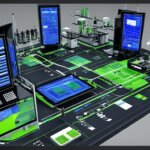Table of Contents
Customer relationship management (CRM) systems are a combination of practices, strategies, and technologies that companies use to manage and analyze customer interactions and data throughout the customer lifecycle. CRM systems aim to improve customer service relationships, assist with customer retention, and drive sales growth. These systems compile customer data across different channels and points of contact to provide customer-facing staff with detailed information on customers’ personal details, purchase history, preferences, and concerns.
Benefits of CRM Systems for Businesses
CRM systems offer a range of benefits to businesses of all sizes. These systems play a crucial role in enhancing customer service by providing customer support representatives with access to valuable customer information. With comprehensive knowledge of customers’ preferences, purchase history, and concerns, representatives can deliver better and faster service, resulting in enhanced customer satisfaction and loyalty.
Another significant advantage of CRM systems is their ability to enable trend spotting. By collecting and analyzing customer data from various channels, businesses can uncover valuable insights and identify emerging trends. This information enables informed decision-making, allowing businesses to adapt their strategies and offerings to stay ahead of the competition.
Automation is another key benefit of CRM systems. These systems automate repetitive tasks such as sales pipeline management and customer support, freeing up valuable time for sales and support teams to focus on more meaningful interactions. This increased efficiency leads to improved productivity and allows businesses to handle a higher volume of customer interactions.
Furthermore, CRM systems are instrumental in customer retention and driving sales growth. By leveraging customer data, businesses can personalize their communication and marketing efforts, ensuring relevant and targeted messages. This personalized approach enhances the customer experience, increases customer satisfaction, and ultimately leads to higher customer loyalty. Additionally, CRM systems provide valuable insights into customer behavior and purchase patterns, enabling businesses to identify cross-selling and upselling opportunities and optimize their sales strategies.
Cutting-edge CRM systems offer advanced features such as artificial intelligence (AI) and predictive analytics, which further enhance their capabilities. AI-powered CRM systems can automate data analysis, provide intelligent recommendations, and even predict customer behavior. These features enable businesses to proactively address customer needs, optimize resource allocation, and drive sales growth.
CRM systems are a game-changer for businesses, empowering them to deliver enhanced customer service, identify trends, automate tasks, retain customers, and drive sales growth. By leveraging the power of these systems, businesses can gain a competitive edge and create meaningful and long-lasting customer relationships.
Components and Capabilities of CRM Systems
CRM systems encompass a wide range of components and capabilities that significantly enhance customer interactions and streamline business processes. At the core of CRM technology lies CRM software, which consolidates customer information into a single database for efficient access and management.
However, CRM systems offer much more than simple data storage. They facilitate various functionalities, including:
- Recording customer interactions: CRM systems enable businesses to track and document every customer interaction, whether it’s through phone calls, emails, social media, or in-person meetings. This comprehensive log of customer engagements ensures that no information is lost and empowers businesses to provide personalized and contextualized support.
- Automating workflow processes: CRM systems streamline and automate repetitive tasks, ensuring efficiency and enabling employees to focus on more strategic initiatives. From lead management and sales force automation to contact center automation and HR management, CRM systems can automate various workflows, eliminating manual effort and minimizing errors.
- Integrating with other software: CRM software interoperates with other applications and systems, creating a unified ecosystem and maximizing the value of existing technology investments. Integration with marketing automation tools, geolocation technology, and analytics platforms allows organizations to create more targeted and data-driven marketing campaigns.
- Offering marketing automation: CRM systems provide features for automating marketing tasks, such as email marketing, lead nurturing, and campaign management. These capabilities streamline marketing processes, deliver personalized messages at scale, and enable businesses to nurture leads effectively.
- Utilizing analytics: CRM systems incorporate robust analytics capabilities to derive insights from customer data. By analyzing patterns, trends, and customer behavior, businesses can make data-driven decisions, identify opportunities for improvement, and optimize their marketing and sales strategies.
- Incorporating artificial intelligence: Some CRM systems leverage artificial intelligence (AI) technologies to enhance customer interactions further. AI-powered chatbots and virtual assistants can handle routine customer inquiries, reducing response times and improving customer satisfaction. AI algorithms can also analyze vast amounts of customer data to identify sales opportunities, optimize processes, and provide personalized recommendations.
- Facilitating project management: CRM systems can integrate project management features, enabling teams to collaborate, assign tasks, and track progress within the CRM platform. This integration streamlines operations, fosters collaboration, and improves project visibility and accountability.
To summarize, CRM systems offer a comprehensive suite of capabilities, from customer interaction recording and workflow automation to analytics and artificial intelligence integration. These functionalities empower businesses to optimize their customer engagement strategies, enhance productivity, and drive revenue growth.
Types of CRM Technology and Choosing the Right CRM System
When it comes to customer relationship management (CRM) systems, businesses have several options to choose from. Understanding the different types of CRM technology can help companies make an informed decision about which system is right for them.
One popular type of CRM technology is cloud-based CRM. These systems utilize cloud computing and can be accessed remotely via the internet. Cloud-based CRM is particularly beneficial for businesses with limited technological expertise or resources, as it does not require extensive hardware or software installations. Leading cloud-based CRM providers include Microsoft, Oracle, Salesforce, and SAP.
Alternatively, businesses may opt for on-premises CRM systems. With on-premises CRM, the servers and infrastructure are installed and maintained by the company itself. This provides greater control over the data but comes with higher upfront costs. On-premises CRM is often favored by larger enterprises that have the necessary resources and IT support to manage their CRM system internally.
An additional option is open source CRM, which allows companies to customize and alter the source code of the CRM software for free. Open source CRM provides a high level of flexibility and can be tailored to meet specific business needs. However, it may require more technical expertise to implement and maintain. Popular open source CRM options include SugarCRM and SuiteCRM.
FAQ
What is a customer relationship management (CRM) system?
A CRM system is a combination of practices, strategies, and technologies that companies use to manage and analyze customer interactions and data throughout the customer lifecycle.
What are the benefits of CRM systems for businesses?
CRM systems offer enhanced customer service, trend spotting capabilities, automation of repetitive tasks, and help with customer retention and driving sales growth.
What are the components and capabilities of CRM systems?
CRM software consolidates customer information, records interactions, automates workflows, integrates with other software, and offers features like marketing automation, sales force automation, contact center automation, geolocation technology, analytics, artificial intelligence, and project management.
What are the types of CRM technology available?
There are cloud-based CRM systems, on-premises CRM systems, and open source CRM systems. Popular CRM vendors include Microsoft, Oracle, Salesforce, and SAP.












